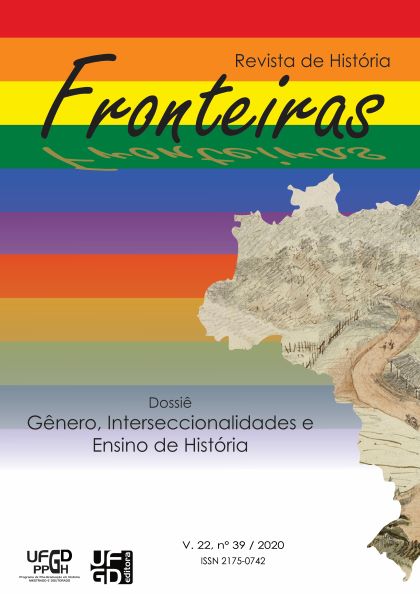A escola como espaço de mediação do conhecimento e humanização
DOI:
https://doi.org/10.30612/frh.v22i39.12570Palavras-chave:
Metodologias de ensino. Ensino da diversidade. Cultura escolar e cultura social. Humanismo diverso.Resumo
O debate proposto busca discutir o papel e a importância da escola como um espaço de mediação e transmissão cultural, a partir da síntese dos conhecimentos científicos escolares e os saberes e experiências sociais, ou pelo menos assim deveria ser. A cultura escolar, resultado dos processos de escolarização e a cultura social produzida na vida prática, devem necessariamente se relacionar integrando campos, estruturas e formas de concepção e compreensão do mundo. Poucos lugares sociais possuem a diversidade e a representatividade da escola, essa condição também se apresenta como uma possibilidade e um imperativo categórico, na construção de uma sociedade mais justa, tolerante, equitativa e democrática. Para isso, nossos professores precisam aprender melhor, como podem ensinar com mais eficiência e eficácia e precisam de formação contínua, ante os desafios e dilemas da educação. Nossas alunas e alunos precisam ‘reaprender’ a aprender, valorizando seus conhecimentos sociais e histórias de vida, também formas de saber, orientando as carências na vida prática. A escola em sua diversidade e pluralidade se tornou um lugar onde se pode ‘existir’ e a educação é o conteúdo dessa ‘resistência’ contra o abuso, preconceito, racismo e toda a violência, a escola tem que ser melhor, porque nossos alunos e alunas precisam ser melhores. O conhecimento aprendido/construído sobre a vida e a diversidade, cria uma qualidade explicativa /compreensiva superior, transformando a própria realidade, ou no mínimo parâmetros compreensivos mais coerentes. Como resultado construiremos uma sociedade que refletirá a escola e não o contrário.Downloads
Referências
APPLE, Michael Whitman. A educação pode mudar a sociedade. Petrópolis, RJ: Vozes, 2017.
BRASIL. Diretrizes Curriculares Nacionais para a Educação Básica. DF: MEC, 1996.
BRASIL. Ministério de Educação e Cultura. LDB – Lei nº 9394/96, de 20 de dezembro de 1996. Estabelece as diretrizes e bases da Educação Nacional. Brasília, DF: MEC, 1996.
BRASIL. Plano Nacional de Educação. Brasília: Senado Federal, UNESCO, 2001.
BUENO, André da Silva; ESTACHESKY, Dulceli Tonet; CREMA, Everton Carlos. Gênero educação e sexualidades: reconhecendo diferenças para superar [pré] conceitos. Uberlândia: Ed dos Autores, 2016.
CANCLINI, Néstor Garcia. Culturas híbridas. São Paulo: Edusp, 2015.
CREMA, Everton Carlos. Currículo, cultura histórica e cultura escolar na construção estética da aula. 2019. 220f. Tese (Doutorado em Educação) – Universidade Federal do Paraná. Curitiba. 2019.
CREMA, Everton Carlos. Rüsen e o “novo humanismo” reflexões para a educação e a diferença. In: BUENO, André da Silva; ESTACHESKY, Dulceli Tonet; CREMA, Everton Carlos. Gênero educação e sexualidades: reconhecendo diferenças para superar [pré] conceitos. Uberlândia: Ed dos Autores, 2016.
ESTACHESKY, Dulceli Tonet. Gênero na escola sim, mas como fazer? In: BUENO, André da Silva; ESTACHESKY, Dulceli Tonet; CREMA, Everton Carlos. Gênero educação e sexualidades: reconhecendo diferenças para superar [pré] conceitos. Uberlândia: Ed dos Autores, 2016.
FORQUIN, Jean Claude. Escola e cultura: as bases epistemológicas do conhecimento escolar. Porto Alegre: Artes Médicas, 1993.
GOODSON, Ivor Frederick. As políticas de currículo e de escolarização. Petrópolis, RJ: Vozes, 2008.
RÜSEN, Jörn. Teoria da História: uma teoria da história como ciência. Curitiba: Editra UFPR, 2015.
SAVIANI, Demerval. História das ideias pedagógicas no Brasil. Campinas, SP: Autores Associados, 2013.
SAVIANI, Demerval. Desafios da construção de um sistema nacional articulado de educação. Revista Trabalho, Educação e Saúde. v.6, n.2, p. 213-232, 2008.
SCHMIDT, Maria Auxiliadora; MARTINS, Estevão de Rezende. (Orgs.) Jörn Rüsen: contribuições para uma teoria da didática da história. Curitiba: W. A. Editores, 2016.
Publicado
Como Citar
Edição
Seção
Licença
Autores que publicam nesta revista concordam com os seguintes termos:
- Autoras e autores mantém os direitos autorais e concedem à revista o direito de primeira publicação, com o trabalho simultaneamente licenciado sob a Creative Commons Atribuição-NãoComercial-CompartilhaIgual 3.0 Brasil, permitindo o compartilhamento do trabalho com reconhecimento da autoria do trabalho e publicação inicial nesta revista.
- Autoras e autores têm autorização para assumir contratos adicionais separadamente, para distribuição não-exclusiva da versão do trabalho publicada nesta revista (ex.: publicar em repositório institucional ou como capítulo de livro), com reconhecimento de autoria e publicação inicial nesta revista.
- Autoras e autores têm permissão e são estimulados a publicar e distribuir seu trabalho online, como em repositórios institucionais ou em páginas pessoais, a qualquer ponto antes ou durante o processo editorial, já que isso pode gerar alterações produtivas, bem como aumentar o impacto e a citação do trabalho publicado (Veja O Efeito do Acesso Livre).


